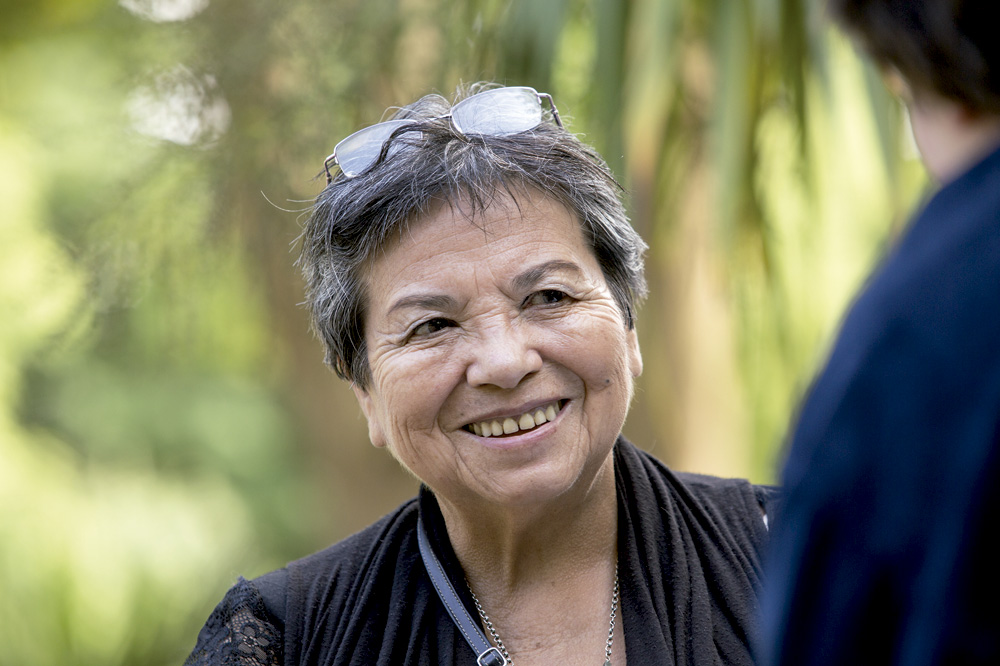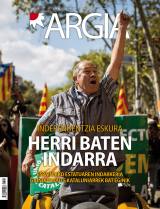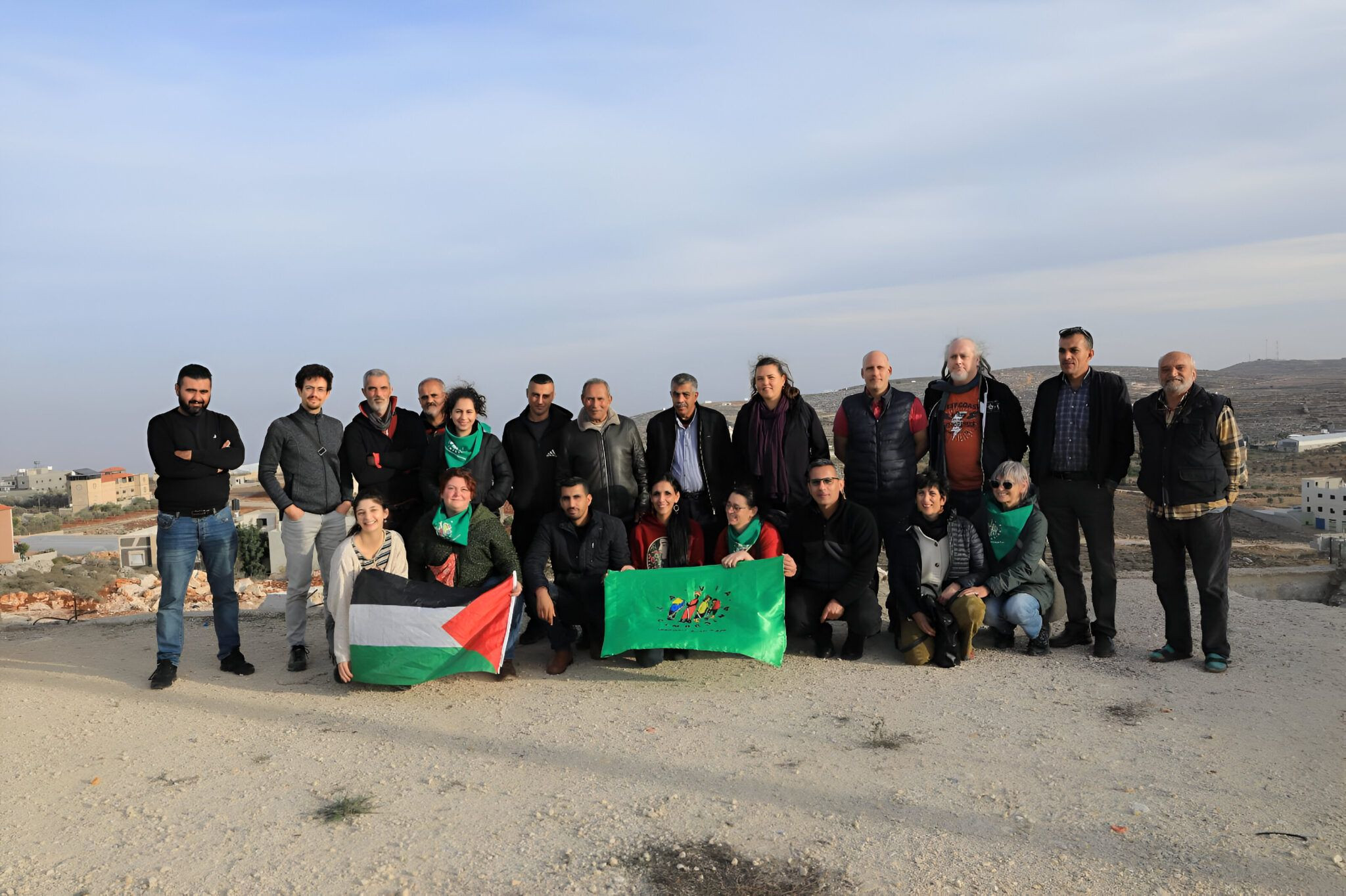"We have made it clear that our feminism is going to be peasant and citizen."
- The La Vía Campesina movement has been underway for a quarter of a century and in July the seventh congress of its career was held in Euskal Herria. In Derio, representatives of peasants from all over the world met, including Francisca “Pancha” Rodríguez, a defender of women and peasants. He believes that there is a great burden on Herron's consciences and does not want to disregard the great challenge, but the one who fought against the Pinochet dictatorship has not yet lost hope.

Gaztetatik hasi zen Francisca Rodriguez borrokan. Lehenik, eraikuntza-lanean, herritarren esku zegoen Txile baten alde, eta ametsa lapurtu zietenean, amesgaiztoaren aurka erresistentzian. Nekazarien elkartetan jardun da beti, eta orain dela hamasei urtetatik, ANAMURI elkarteko kide aktiboa da: Txileko landako emakumeen eta emakume indigenen alde borrokatzen dira.
How did you start in activism?
Oops! That was a long time ago! As a young person. My partner, my husband, was responsible for the youth area of the Confederation of Farmers in Ranquil, and I think that had to do with that. We were in the midst of land reform in Chile, just now it is 50 years since the law was passed last summer. We were building a country project, since Allende took office as president. We were filled with passion, and I think that's why we started this historic challenge of building the people's government, although it lasted no more than a thousand days. That is why we came from these heroic times: we were privileged young people, we dreamed of a different future, which was suddenly interrupted by the military dictatorship.
How?
The sedition started soon after Allende took office. We live the same thing that Venezuela is living today: an aggressive extreme right, a giant terror campaign, cutting food supplies… There you realize the weight and value of food in the world, how it can be used to press and tread, is a tremendously effective tool. It has a lot of influence: Chile fell, and then socialism, and then Nicaragua, all with the same method. And now Venezuela is under threat.
You fought the dictatorship.
They're really hard, terrible memories, because it was a very bloody dictatorship, there was no family that didn't have a partner or a family member in jail, missing or in exile. Then there are those who are like dead, even if they live, my brother, for example, is desolate, because they had tortured him horribly. The consequences of the dictatorship are still being experienced on the skin.
But at one point, they didn't resign.
No, we were able to build important alliances, we kept it with dignity, and time and time again we claimed that agrarian reform was going to take place in our people. We fought to end the dark night of the dictatorship, never resting, and in the end came democracy, not agrarian reform. Our dreams got frustrated, because the dictatorship left a constitution ready to contribute to very strong capitalist development. And that is what has happened... Yesterday we were considered a brave people, an organized people who faced a harsh dictatorship, and today we are a country of success in Latin America, the smallest, the end of the world and yet the most important. Chile currently has the best economic indices and the worst social indices.

What situation do you see in Latin America?
Today, we have counterforms, all the historic agricultural processes are being restored, from Mexico to Chile, precisely because capital wants natural resources, and because natural resources are in our lands, in our communities. They are occupying our lands, the land is no longer ours, the country is not ours. Mining, resource extraction -- they're taking countries, they're selling countries. We are dealing with a truly malicious economic system, and those that appear to be opportunities often become a threat.
What do you need?
For us to speak of land reform is to speak of the right of peoples to healthy food, of the right to cultivate land, of the defence of our natural resources. And debate about our way of living, about the right to health and education in rural areas, about the existence of roads that benefit us and us, farmers, etc. Today they are building large roads to get goods out of the country and we are locked in between those roads.
Each country must work its gaze, a view of national development, contrary to speculative financial capital. That capital oppresses our Governments; today capital has more influence on Governments than those peoples. We peoples are lost, exhausted. However, we are not defeated at all. As I always say, there is no evil that lasts for a hundred years, no people that can bear it.
That's why you keep fighting.
We are shattered, so we are working on the construction of CLOC (Coordinator of Rural Organizations of Latin America) and La Vía Campesina. Every day, the agricultural sector is declining in every country, but this is where more and more organizations are involved. It's not that there's more organizational capacity now, it's dividing movement. We, on the other hand, are several organizations in CLOC-La Vía Campesina, but under the same flag we all move.
Why is it so important to fight together?
In these political moments that we live today, alliances are the key. We are clear, as a sector, that we are not going to win the battle alone, that is why we need to build more consensus, and I believe that we have done so at international level, but I believe that we need to strengthen the networks in the territories themselves. Those who share objectives or interests must be articulated, if only to achieve this.
They say that capitalism is in crisis... but what crisis? We are in crisis, capitalism has not been in crisis for decades. The crisis invents capital, one after the other, and who wins? We don't, we stay there, more naked than before. We must therefore regain confidence and nurture hope. We have to globalise the struggle, that is our slogan, but we also have to globalise hope.

What is CLOC and how did it get started?
We started the road next to La Vía Campesina. The roots of this movement are closely linked to Latin America, since on the 500th anniversary of the “discovery” we did a great job of organizing indigenous, peasant, black and popular resistance. So we met. We claimed that Latinos had nothing to celebrate, but that we had ourselves to discover it. We've been articulating this campaign for five years, and we realized that if we were able to organize it, we could articulate something beyond the borders of Latin America, along with other movements that at the time were making power, like the EHNE. So we get to that agricultural articulation of the world. It was an exciting birth, we had goals and dreams, but at that time we didn't know that La Vía Campesina was going to have so much influence on the world.
Not only as a farmer, but also as a woman.
Women talked clearly nothing else about creating La Vía Campesina. During the creation of La Vía Campesina, this was one of the most passionate controversies: to see what value would be given to the work of women and what place it would occupy within the process. That was important, and you don't think it was a tender discussion. I remember one woman talking very strongly about those polemics that came up, and I thought we weren't alone, and we could do it together, so that La Vía Campesina gave importance to women's participation since its inception. We did, yes, and I think we marked a milestone. In 1992 La Vía Campesina was created, in 1993 CLOC was created, and in its creation we also talked a lot about this process of other women.
You founded ANAMURI (National Association of Rural and Indigenous Women of Chile).
He was representing another organisation in the CLOC as the representative of the Confederation of Ranquil. At that time, women's organizations were being created on a massive scale. We didn't want them to consider us as the organization of women, we wanted to be part of the movement and be up to the other institutions. And under those conditions, we created ANAMURI, a women's space. From the beginning we said that we were not a ghetto, but a space that wants to strengthen ourselves and our colleagues. The goal, moreover, was to fight with other colleagues and to contribute to the movement. We were born rebellious, with the intention of reversing all the macho attitudes of the historical movement, which have been institutions with very patriarchal logics and in which women have been in the background. We wanted to sit at the front table with the other organisations, and after a year we managed to be a fully-fledged organisation, with a voice and a vote.

Rural women and indigenous women meet you in the organization.
That also has something. At first we were ANAMUR and we joined because we were rural women: peasants, artisans, indigenous… We gathered the diversity of the rural world. But then, indigenous women denounced that society has always marginalized and erased them, and that they would not be invisible again. Thus, we became a national association of rural and indigenous women, ANAMURI.
On the other hand, we have had profound debates with indigenous women, because the task that Latin American women have imposed on us is that we take ourselves as feminists and build our feminism, and because some of the indigenous women of our association did not agree with it.
Is there mistrust towards feminism?
In the rural world, they've always presented feminism as something terrible, so we've had to take the devil off it. We have made it clear that our feminism will be peasant and popular. To work with the feminists of the city, they have to know that we are working-class.
We continue to build our feminism, we're filling ourselves with content. For example, the members of Paraguay said that popular and revolutionary feminism is going to be ours. On this road of construction we have had to tear down the walls in our heads and in our organisations, and we have had to show that our activity is a feminist, because we are not only defending women’s rights, but also the interests of women.
This is a Latin American process. We may share it with the European partners, but La Vía Campesina is a plural movement, there are cultural borders, patriarchy appears in different ways and everyone has to make their own decisions and make the way.
Let us talk about food sovereignty. They say it's a beginning, not a concept.
We are full of concepts, often empty, that we cannot and cannot interpret. However, principles are defended and principles are maintained. The members of Cuba add something more to this definition: the principles are defended, maintained and not negotiated. For us, food sovereignty has taken on that dimension. We can't ask everybody for it, but it's the foundation of our communities that care for and live in the land.
Food sovereignty consists of rights. There is no food sovereignty unless there is a right to own the land, to cultivate it, to fill it with monoculture or to build buildings.
Elkarrizketa amaitu ostean, jaioterriaz galdetu diot Rodriguezi, eta hauxe kontatu dit Lo Espejori buruz: “Garai batean, tren-geltoki garrantzitsu bat zegoen han. Hegoaldetik Santiago hiriburura zihoan trenak hantxe egiten zuen azken geldialdia, eta ispilu txiki bat ateratzen zuten bidaiari denek, apaintzeko. Horregatik jarri zioten izena”. Orain, berriz, Lampan bizi da Rodriguez, Santiagotik iparraldera dagoen landa-eremuan, eta nekazariek erabiltzen zituzten trenbide-sareak kendu izana deitoratu du.
Merkataritzaren Munduko Erakundea eta Elikadura Burujabetza kontzeptu antagonikoak dira. Lehenbizikoaren helburua da urratsez urrats mundu osoan merkatu “libre” bat eraikitzea, baita nekazaritzan ere, ekoizpena oztoporik gabe eramateko munduko leku batetik bestera,... [+]
Larunbatean Derioko Nazioarteko Konferentziari amaiera eman eta gero, manifestazioa egin da igandean Bilbon, La Via Campesinak deituta. Moyua plazatik Zazpi Kaleetako Plaza Barrira arteko ibilbidea egin dute ia 2.000 lagunek, eta ondoren bazkaria izan da. Horren aurretik... [+]
Euskal Herriko Deia zabalduz amaitu da La Via Campesinaren VII. Nazioarteko Biltzarra Derion. Lau egunez eztabaidan aritu eta gero, biltzarraren ondorioak biltzen dituen adierazpena aurkeztu dute bi ordu inguruko ekitaldi hunkigarri batean. Mundu osoko 200 milioitik gora... [+]
Argentina iparraldeko Santiago del Estero probintziatik etorri da Deolinda Deo Carrizo La Via Campesinaren Nazioarteko Biltzarrera. Nekazari indigenen eskubideen alde borrokan diharduen MNCI (Nekazari Indigenen Mugimendu Nazionala) taldeko kidea da, baita mugimendu... [+]
La Via Campesinaren Nazioarteko Biltzarraren egitarau osagarriaren barruan, nekazarien eskubideen urraketari buruzko txostena aurkeztu zuten asteazkenean. EAEri dagokion atalaren egileak, Leticia Urretabizkaia EHUko ikerlari eta hezitzaileak, gurekin hitz egin zuen aurkezpena... [+]
“Elkarte txikia gara eta guretzat erronka handia da nazioarteko konferentzia hau antolatzea, baina gure errealitatea ikusarazteko aukera bikaina ere bada”, esan digu Alazne Intxauspe EHNE Bizkaia sindikatuko kideak, La Via Campesinaren VII. Nazioarteko Biltzarra... [+]
Jendez mukuru izan da Derioko apaiztegi zaharreko eliza zena, Biltzarraren inaugurazio ekitaldian. Dantzak, kantuak eta musikak hartu dute lehenbiziko ordua, mezu politikoek bigarrena. Amaieran, azken urteetan La Via Campesinarekin bat egindako elkarte berrien aurkezpena egin... [+]
Pertsonak elikatzeko nekazarien beharra du munduak. Eta modu egoki eta jasangarrian egiteko, edozein ereduk ez du balio. Hala aldarrikatu du Miguel Blancok, Espainiako Estatuko nekazari elkarteen COAG federazioko idazkari nagusi eta hizlari kementsuak, La Via Campesinaren VII... [+]
Derion egin berri den La Via Campesinako V. Emakumeen Biltzarra historikotzat jo du Sandra Moreno Cadena antolatzaileetako batek. Moreno kolonbiarra da jatorriz, baina Espainian bizi da. Andaluziako Langileen Sindikatuko kidea da, eta zehazkiago Landa-eremuko Langileen... [+]
Nekazari gazteen nazioarteko laugarren asanblada izan da La Via Campesinaren VII. Nazioarteko Biltzarraren lehen urratsa. Egun eta erdiko bilkurak emandakoa azaldu digu Paula Gioiak, La Via Campesinaren koordinazio batzordean Europak dituen ordezkarietako batek.
Arafat Jaradat, Palestinako UAWC nekazari-antolakundeko kidea, La Via Campesinaren VII. Nazioarteko Biltzarrean parte hartzen ari den 500 inguru pertsonetako bat da. Hebronen bizi da, Zisjordanian. Israelen erasoak direla-eta palestinar nekazariek eguneroko lana egiteko dituzten... [+]
La Via Campesina nekazarien nazioarteko mugimendua Euskal Herrian egiten ari da VII. Nazioarteko Biltzarra, uztailaren 16tik 24ra bitartean. ARGIAk egunero emango du haren berri.






















